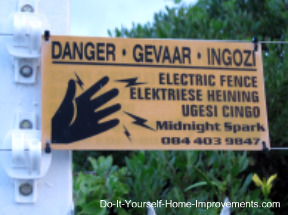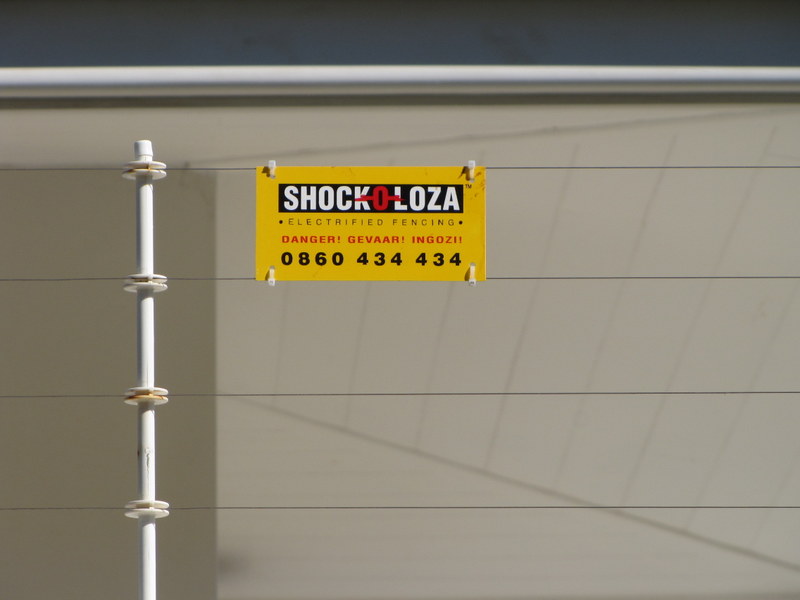Electric Fencing...
Your first line of defense
I want to show you the value of installing electric fencing as a first line of defense when it comes to home security. There are a few obvious advantages to electric fencing as a security barrier on your perimeter walls, as it acts as:
- A physical barrier,
- A psychological barrier, and
- An early warning system.
The visual appearance thereof will be a definite deterrent to a potential intruder as it will cause a delay to enter your property and also when they want to exit again.
If your electric fence is correctly installed and wired, the possibility and magnitude of shock that may be experienced will be a huge deterrent for most intruders from trying to enter your premises. This psychological barrier the person must overcome is probably one of the best advantages an electric fence has as a first line of defense. It will deter most people and send them off to look for some easier pickings.
But in my opinion, the best thing about this type of fence is that if the intruders do overcome their fears and decide to enter your premises in any case, the alarm system to which it is connected to, will immediately notify you or your security company about the breach. In this way the electric fence has served its purpose as a first line of defense and an early warning device.
In South Africa property owners are going to have to be more careful about who they contract to install electric fences so as to comply with a new regulation.
This regulation stipulates that all electric fences be certified and come with an electric fence system certificate of compliance, as reflected in Regulation 12 of the Electric Machinery Regulations of 2011.
OK, so now that we know why we should install electric fencing, let's look at how it works....
Electric fencing was originally developed to restrict the movement of animals. Subsequently, the security industry used the technology and improved on the initial design and developed a system that acts as a very effective barrier for unwanted intruders at your home.
The system works by sending a high-voltage electrical pulse around a multi-wire perimeter fence. The source of this high-voltage pulse is called an “energizer”. One terminal of the energizer is connected to the “Live” wire circuit and the other to the “Earth” wire circuit, which is also connected to a metal rod planted into the ground.
The potential of the pulse may vary between 2,500 and 12,000 Volts, depending on the equipment used, but the current is limited to a safe level and the pulse lasts only for a few milliseconds at a time, ensuring that it is non-lethal.
When an intruder tries to breach the electric perimeter fence, he invariably becomes part of an electrical circuit and the high voltage pulse will now flow through his or hers body to the closest earth point. This will cause a severe shock and leaves the person temporarily incapacitated. The strength of the shock depends on the power available from the energizer and the total resistance of the circuit.
So, how does your system warn you...?
There are a number of ways in which the system is monitored:
- If the wires are deflected by vertical movement, or
- If there is contact between the “Live” and ”Earth” circuits, or
- If the wires are cut,
then the system will cause a short circuit on the fence line and trigger the alarm system, giving an audible and visual indication of a breach. It is the best if the fence is zoned for easier detection of where the fence was breached. On some estates, the perimeter fence can be kilometres long and zoned fencing ensures that the guards can get to the entry point quickly
Nowadays, the monitoring and controlling of your system is so sophisticated that you can monitor and keep an eye on your system from anywhere in the world and you can:
- Arm and disarm your system,
- Be notified of any alarm activation,
- Be notified of power failures,
- and many other features too...
I would suggest that you always connect your fence alarm to a security company for monitoring as well. This not only gives you a lot more ease of mind when your family is alone at home, but it also gives you a back-up plan for when you are home with them.
Let's face it, us men might sometimes feel we are tough and invincible, but when you are woken in the middle of the night and has to face one or, God forbid, more than one hardened criminal/s, then the fact that someone else is on the way makes it much easier to make the right decisions.
Now, let's look at how to do it...
Whether you decide to install your fence yourself, and it is quite easy, or get professionals in to do it for you, there are a few pointers that will ensure hassle free use of the system for many years to come.
Just make very sure that you are compliant to ALL the safety regulations as stipulated by your local authorities.
Here are some guidelines that will make sure your fence is compliant:
- Owner must be in possession of an electric fence system certificate of compliance. If you did the installation yourself, then you will have to get a certificate of compliance from a registered installer.
- The output should not be adjusted to make it more lethal.
- There must be proper warning signs visible on the fence, warning people about the dangers of the fence, that can be clearly seen from the driveway and pavement.
- It should not overhang into a neighbour's yard or pavement.
Always use the best materials available. I live in Cape Town and with the beautiful lifestyle that comes with this, there are a few disadvantages that goes with living so close to the sea. The one we are concerned about here is the salty air and corrosion.
- Use only 316 grade stainless steel wire, strainers, springs and fittings.
- Use the best insulators available and buy a high quality energizer.
- Always make sure that all your uprights are hot-dipped galvanised to a standard that is accepted in your country for coastal installations.
In South Africa this standard is SABS ISO 14621 of 2000. For an even better protection I advise that you have it powder coated too.
Even if you do not have the problems that comes from living close to the sea, I suggest that you insist on using these materials as mentioned above. A properly installed system ensures the minimum of maintenance and your electric fence will last for many, many years. It will also ensure that
False alarms are virtually non-existent!
There is nothing as irritating as a lot of false alarms. False alarms also creates in your mind the sense of unreliability and if you do not trust or believe that your system operates correctly, then you will not act as you should, should someone one day really try to enter your property. By installing your electric fence correctly and with the right materials, and by maintaining it well, the fence will only go into alarm mode when a concerted effort is made to breach your perimeter security.
If you have done all of the above, don't you agree that you will now have lots of faith in your first line a defense?
I believe you do!
Return from Installing Electric Fencing to Do It Yourself Home Security




New! Comments
Have your say about what you just read here! Please leave me a comment in the box below.